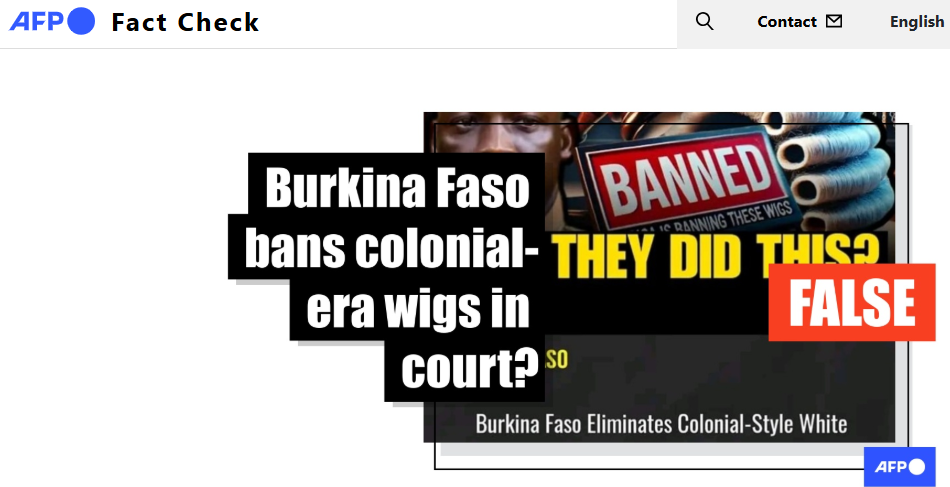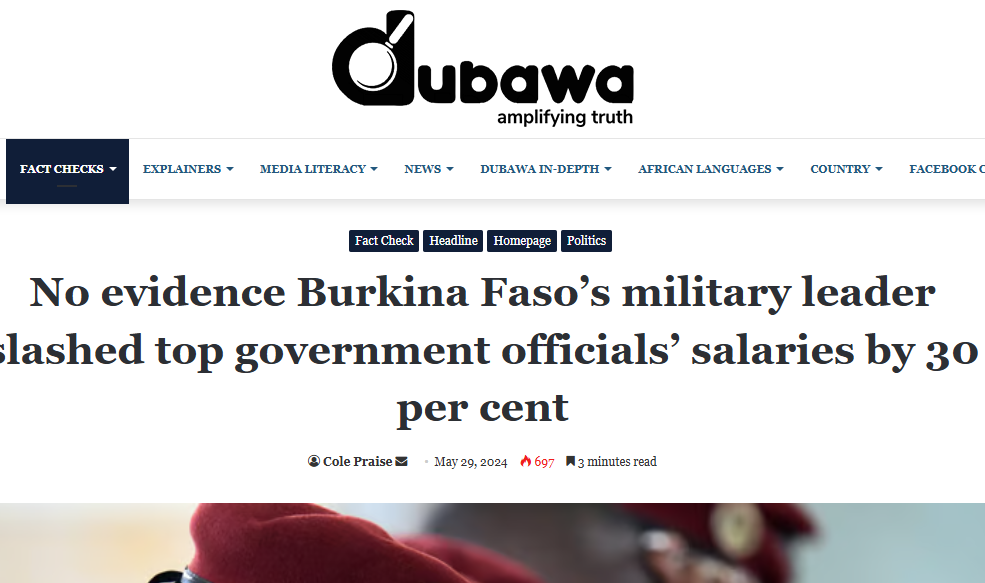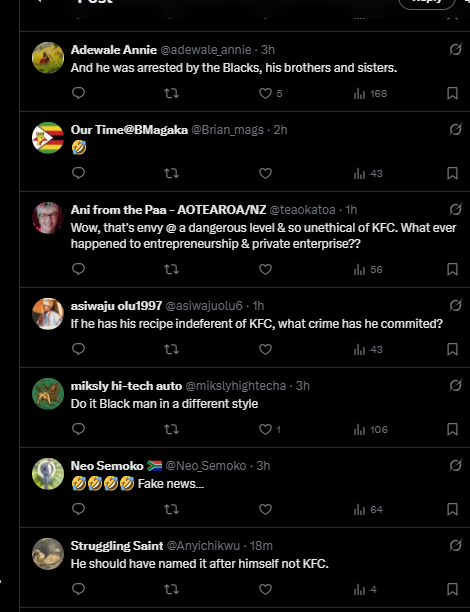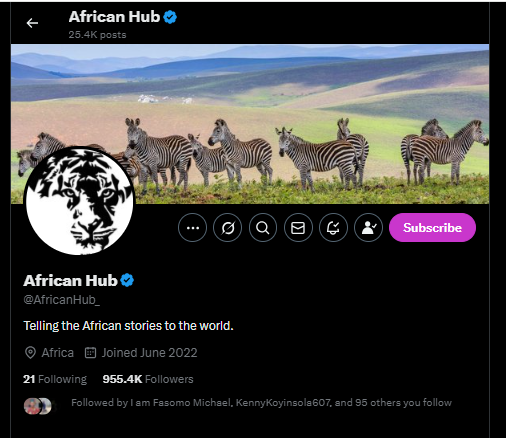By Dare Akogun
In Nigeria’s rapidly evolving digital media ecosystem, where platforms like X (formerly Twitter) increasingly influence public discourse, a network of accounts is leveraging Pan-African rhetoric to spread divisive content. One example of this trend is @AfricanHub_, an X handle that publicly identifies with the cause of African unity and development.
However, investigations reveal that behind the façade of Pan-Africanism lies a coordinated effort to manipulate narratives, deepen socio-political divisions, and weaken democratic ideals across the continent.
There is a troubling pattern of the account systematically amplifying misinformation, often laced with pro-Russian and anti-Western sentiments, undermining democratic discourse in Nigeria and beyond.
A facade of Pan-Africanism
The account @AfricanHub_ describes itself as a platform for “African news, culture, and unity,” with a bio that emphasises “decolonising narratives” and “amplifying African voices.” As of May 2025, when this analysis was conducted, the account has over 947,000 followers, a notable reach for a relatively new profile created in June 2022.
Its posts blend legitimate African cultural content, highlighting traditional festivals or economic achievement, with inflammatory political commentary. This mix creates a veneer of authenticity, masking a seemingly insidious agenda.
Pan-Africanism, a movement advocating the solidarity and unity of African people, has historically aimed to foster economic, social, and political progress across the continent. However, in the digital landscape, particularly on X, the @AfricanHub_ appears to be cloaking itself in this rhetoric while peddling divisive and anti-democratic narratives.
Using OSINT tools like X-Advanced Search and Julius, DUBAWA finds an interesting pattern of activity on @AfricanHub_ _’s page from January 1, 2025, to May 31, 2025, a period where military governance appeared to be praised in the continent’s digital spaces.
The analysis revealed 6,195 posts, with a notable surge in April, which had 2,010 posts, and March, which had 1,485 posts. Posting activity has shown a general upward trend over the period, revealing a recurring focus on three themes: criticism of Western influence in Africa, praise for Russian or Chinese geopolitical moves, and calls for radical political change in Nigeria.

Screenshot of the monthly posting pattern from January 1, 2025, to May 31, 2025

Screenshot of the top 5 days with the highest total engagement from January to May 2025
Posts from the account reveal a mix of content, including positive reports on African developments (e.g., infrastructure projects in Burkina Faso, Mali, Rwanda, and Namibia) and politically charged narratives.
The analysis highlights 36 posts, about 0.58% of the total content within the five months, that were flagged for potentially misleading or exaggerated claims. These flagged posts predominantly carried negative sentiment (20), with others classified as neutral (11) or positive (5).

Screenshot of sentiment distribution in a potentially misleading post
The flagged misleading posts attracted significantly higher engagement, averaging 2,835 interactions compared to 2,246 for regular posts.
Such findings raise concerns about how X’s algorithm may amplify emotionally charged or deceptive narratives, further complicating efforts to combat disinformation in Nigeria’s online space.
Instances of misinformation and disinformation
We identified several instances of misinformation from posts by the account made between January 1 and May 31, 2025.
On March 21, 2025, the account published a post (archived here) containing 19 claims about the achievements of the Junta leader in Burkina Faso, Ibrahim Traore. The post had 1 million views, over 31,000 likes, over 8,900 retweets, and over 1000 comments as of the time of verification on May 30, 2025.
The article titled ‘Two Years of President Ibrahim Traore of Burkina Faso: A Report Since Assuming Leadership of the Nation’ can also be found on Facebook, Instagram, and LinkedIn, with numerous comments hailing the Burkina Faso leader.
Screenshots of the claim as it appeared on numerous social media platforms
No official source was attributed to the report. However, a search on Google reveals a report published on Jan. 19, 2025, by a Ugandan news website, PML Daily, which describes Traore’s two-year rule as a new era.
One claim on the list is that Burkina Faso is declining loans from the International Monetary Fund (IMF) and the World Bank. However, research conducted by DUBAWA this year revealed that there are no credible reports of Burkina Faso’s president rejecting loans from the IMF and the World Bank, adding that “on the contrary, Burkina Faso received funding from both institutions in 2023 and 2024, respectively.”
The IMF has been supporting Burkina Faso with a four-year Extended Credit Facility (ECF) arrangement, approved on September 21, 2023, for a total of SDR 228.76 million (approximately US$302 million), with disbursements continuing into 2025. In fact, on April 8, 2025, the IMF reached a staff-level agreement with Burkina Faso on the third review of the ECF arrangement, enabling a disbursement of about US$32 million.
Reuters fact-checked another claim on the list that Ibrahim Traoré said cleared Burkina Faso’s domestic debts and found it to be false.
There was also the claim that the president prohibited the use of British legal wigs and gowns in local courts, replacing them with traditional Burkinabé attire. This claim, reported by a popular Nigerian television station, AriseTV (archived here), was found to be false in a fact check by AFP.

On March 26, 2025, African Hub shared a post (archived here) stating that South Africa has successfully developed a cure for HIV. However, a Google search revealed that the claim was linked to research conducted by the College of Health Sciences, University of KwaZulu-Natal, titled ‘Groundbreaking South African HIV cure trial shows promising results’, which was presented at the 2025 Conference on Retroviruses and Opportunistic Infections (CROI), in San Francisco, United States (US).
Part of the research stated that a ground-breaking HIV cure trial conducted in Durban, South Africa, has demonstrated promising results in achieving antiretroviral therapy (ART)-free virus control adding that the development was not a cure but a trial involving combination immunotherapy in Durban, with 20% of participants remaining virally suppressed and off antiretroviral therapy (ART) for a year and half. This makes the claim false and misleading.
On March 27, 2025, another X post by African Hub (archived here) suggested that Madagascar developed a COVID-19 vaccine that was ignored by the world because it is an African country. DUBAWA conducted web searches here, here, and here, confirming that Madagascar promoted Covid-Organics, a herbal remedy based on Artemisia annua and other local plants, claimed by President Andry Rajoelina to prevent and cure COVID-19.

However, there is no scientific evidence supporting its efficacy, and the World Health Organisation (WHO) stated that there was no proof of its effectiveness, noting that COVID-Organics was not a vaccine but a traditional remedy, which renders the claim misleading. Despite claims of a cure, Madagascar still pleaded for support as COVID-19 cases soared in the country in July 2020, as captured in this news report.
Another claim that Traore cut the salaries of ministers and parliamentarians by 30% while raising civil servants’ salaries by 50% was debunked in 2024 by DUBAWA here.

On May 13, 2025, African Hub shared an image in a post accusing the BBC of falsely reporting that Burkina Faso’s leader, Ibrahim Traoré, was responsible for killing civilians.
The post instead claimed, without providing any evidence, that the attacks were carried out by terrorists allegedly supported by France.
However, the BBC story was based on a report by the Human Rights Watch (HRW), which revealed that the killings occurred following an operation led by Burkinabè special forces, resulting in widespread civilian deaths and displacement of ethnic Fulanis.
In a separate case of misinformation, a post from the account on May 25, 2025, alleged that a man was arrested for starting his version of KFC. This story is entirely fabricated and traces back to a widely circulated hoax from 2019, in which a man was reportedly arrested for allegedly eating free KFC for a year by pretending to be from the company’s headquarters.

Comments by X users on the post
DUBAWA conducted a reverse image search on the picture and found that it is a year old and was previously used on Facebook and Instagram with the same claim, that the man arrested for starting his own KFC at home in South Africa. These posts added that the man’s KFC was so good that he got more orders than the actual KFC.
KFC South Africa publicly denied this claim in a report published in 2019.
The X account recycled the misinformation in a new form, presenting it as new, lacking any credible evidence or news reporting to support its authenticity. This further highlights the persistent nature of old falsehoods being reshaped and recirculated in light of current events by the account.
The account’s posts often receive significant engagement, with some posts garnering tens of thousands of views, likes, and retweets. For example, the post (archived here) about Kim Jong Un’s alleged promise to support Burkina Faso received over 924,000 views with 48,000 likes and 538 comments when it was archived on May 21, 2025, and that of the post (archived here) about Burkina Faso leaders’ two years in office which has garnered one million views, 31000 likes, 8900 retweet and over 1000 comments as of May 30, 2025.
Influence operations
Analysis of comments on the above instances reveals several patterns of pro-Russian and anti-Western narratives. Many posts defend figures like Ibrahim Traoré, who has ties to Russia, as contained in this report, and promote narratives critical of Western countries, particularly France and the United States.
For example, the post about Kim Jong Un’s alleged promise to support Burkina Faso aligns with pro-Russian narratives, portraying Burkina Faso as a target of Western aggression.
Another noticeable point is the frequent dismissal of Western media reports by outlets like the BBC, labelling them as “lies” or “misinformation.” The May 13, 2025, post criticising the BBC for reporting on civilian killings by Traoré’s regime instead of blaming France-backed terrorists is a clear example.
Posts from the account often praise leaders like Traoré for their anti-Western stances and security efforts while downplaying or denying allegations of human rights abuses.
Most claims made by the X account are often unverified or lack credible sources, leading to accusations of misinformation.
Disinformation campaigns in Africa
To understand @AfricanHub_ _’s role, it is crucial to consider the broader landscape of disinformation in Africa.
A report by the Africa Centre for Strategic Studies noted that Russian-sponsored networks are spreading disinformation in over 22 African countries. Their tactics include using paid influencers, digital avatars, and fake videos to reach millions via coordinated fake X pages and posts.
The impact of such campaigns is particularly notable in West Africa, with 72 campaigns targeting 13 countries, 50 percent Russian-linked, and 19 in the Sahel (Mali, Burkina Faso, Niger) promoting coups.
For instance, after the Niger coup, content on Russian/Wagner Telegram channels spiked 6,645%, indicating coordinated efforts to exploit political instability.
Given Nigeria’s prominence in West Africa, @AfricanHub_’s activities could exacerbate tensions, especially with posts promoting Russian security assistance, potentially undermining trust in democratic processes.
The real-world consequences of @AfricanHub_ ’s misinformation are stark. During the 2024 protests in Nigeria, the spread of pro-Russian narratives on X and Telegram led to the arrest of minors waving Russian flags, with some facing the death penalty charges, as highlighted in DUBAWA’s OSINT report.
President Bola Tinubu’s eventual release of 29 minors followed public outcry, but the incident underscores how online disinformation can escalate into tangible harm.
X as a conduit for disinformation
X’s minimal content moderation, especially since staff reductions in 2023, has made it a fertile ground for disinformation. Unlike Telegram, which relies on encrypted channels, X’s public nature allows accounts like @AfricanHub_ to reach broader audiences quickly.
The platform’s algorithm prioritises engagement, meaning inflammatory posts such as @AfricanHub_’s post of March 21, 2025 (archived here) containing 19 claims about the achievements of the Junta leader in Burkina Faso, Ibrahim Traore, in two years often go viral, amassing millions of views and thousands of retweets.
Silas Jonathan, the digital investigations manager for the Digital Technology, Artificial Intelligence, and Information Disorder Analysis Centre (DAIDAC), stated that since its rebranding from Twitter to X in 2023, the social media platform has undergone significant changes in its content moderation policies. The changes, driven largely by a monetisation model that rewards engagement, have led to a disturbing uptick in the spread of politically charged disinformation across African digital spaces.
“These changes are significantly impacting the quality of online discourse, particularly in countries like Nigeria. Our research from last year indicates a significant impact of this reduced moderation. We found that politically charged disinformation in African digital spaces, with a specific focus on Nigeria, has more than doubled since these changes were implemented on the X platform,” he said.
Jonathan explained that the relaxation of content policies on X, especially since Elon Musk’s acquisition, has made the platform a hotspot for divisive narratives and orchestrated manipulation.
An example is this Africa Check report, which discusses the year 2025 and how Kenya is grappling with five major disinformation trends: politically motivated spin, AI-generated false content, vaccine-related conspiracies, employment scams, and misinformation surrounding judicial reforms.
“Disinformation actors often exploit anti-colonial sentiments, exacerbate internal divisions, disseminate conspiracy theories, distort historical facts, and even subtly promote external agendas,” he said.
He added that DAIDAC’s findings show that a large number of these disinformation campaigns are coordinated and designed to look organic, making them harder to detect and debunk.
“X’s engagement-driven algorithm inadvertently amplifies this type of content by prioritising virality over accuracy. This leads to echo chambers, the dominance of decontextualised information, and reduced visibility for credible sources. The algorithm can hinder the dissemination of reliable information within Pan-Africanist communities and the wider digital space,” Jonathan noted.
Nigeria’s Cybercrimes Act, as explained in this CJID’s article, aims to curb false information, but enforcing it against accounts like @AfricanHub_is is fraught with challenges.
Mohamed Yunusa, a Lagos-based lawyer, explains that X’s servers, located outside Nigeria, complicate jurisdictional oversight. Additionally, the platform’s pseudonymous nature makes tracing account operators difficult.
In Mohamed’s words, “Disinformation thrives in these gaps.”

